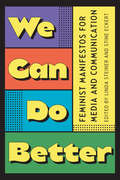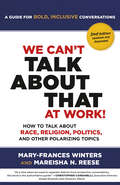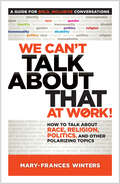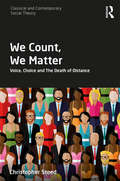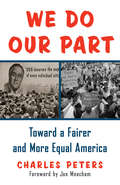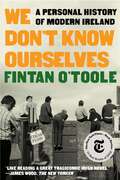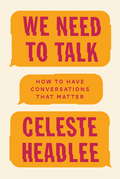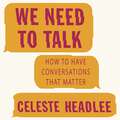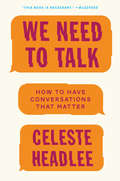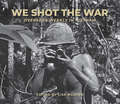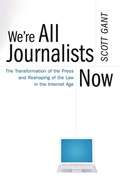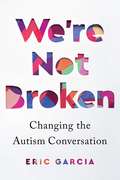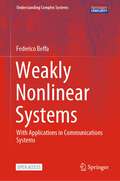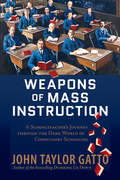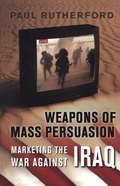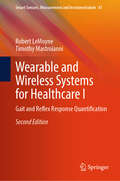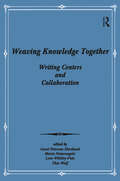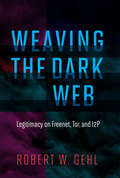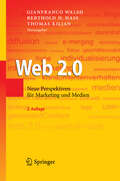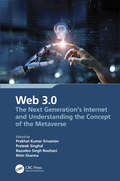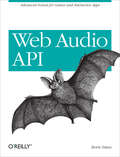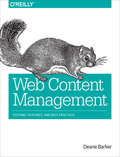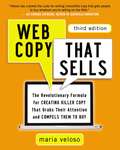- Table View
- List View
We Can Do Better: Feminist Manifestos for Media and Communication
by Meenakshi Gigi Durham Carolyn Kitch Lori Kido Lopez Linda Steiner Sahar Khamis Kim Hong Nguyen Summer Harlow Dafna Lemish Dustin Harp Stine Eckert Miglena Sternadori Eve Ng Gina M. Masullo Frieda Werden Denetra Walker Erin L. Perry Carolina Velloso Katy Fulfer Jade Metzger-Riftkin Amara Imari SugalskiFeminist Manifestos for Media and Communication brings together evidence-based manifestos for media and communication that take a feminist perspective and add up to a provocative vision of feminist media practices and of feminist communication. The book discusses critical problems and complaints in ways that identify and make the case for actionable, concrete solutions to media problems and deficiencies; it shows how feminist thinking can be usefully and effectively applied to a wide range of journalism, media, and communication practices. The manifestos are not “only” about women but rather offer specific, feasible blueprints for restructuring media in ways that make them fairer and more equitable along many vectors of identity, so that media can better serve democracy. These manifestos give concrete solutions to specific problems that can and should be implemented by journalists, media practitioners, students, faculty, and scholars. The manifestos are organized around three sets of demands: for better media practices, for more participatory online spaces, and for more precise and appropriate language.
We Can't Talk about That at Work! Second Edition: How to Talk about Race, Religion, Politics, and Other Polarizing Topics
by Mary-Frances Winters Mareisha ReeseIn developing the skills necessary to engage in Bold, Inclusive Conversations around polarizing topics, we can acknowledge that these subjects are complex, that there are no simple answers, and that it takes time and practice to learn how to do it well.Politics, religion, race-we can't talk about topics like these at work, right? But in fact, these conversations are happening all the time, either in real life or virtually. And if they aren't handled effectively, they can become more polarizing and divisive, impacting productivity, engagement, retention, teamwork, and even employees' sense of safety in the workplace.In this second edition of We Can't Talk about That at Work!, best-selling author Mary-Frances Winters and new coauthor Mareisha N. Reese of The Winters Group, Inc., provide fresh examples, updated research, and compelling insights. Featuring a new chapter on how two organizations have actualized the model for Bold, Inclusive Conversations as well as a discussion guide and updated glossary, this modern classic offers step-by-step guidance for conducting structured conversations around polarizing topics. Leaders and organizations can address sensitive subjects head on in a way that brings people together instead of driving them apart.
We Can't Talk about That at Work!: How to Talk About Race, Religion, Politics, and Other Polarizing Topics
by Mary-Frances WintersInstead of shutting down any mention of taboo topics, Mary-Frances Winters shows how to structure intentional conversations about them, so people can safely confront biases and stereotypes and create stronger, more inclusive organizations.Politics, religion, race - we can't talk about topics like these at work, right? But in fact, these conversations are happening all the time, either in real life or virtually via social media. And if they aren't handled effectively, they can become more polarizing and divisive, impacting productivity, engagement, retention, teamwork, and even employees' sense of safety in the workplace. But you can turn that around and address difficult topics in a way that brings people together instead of driving them apart. As a thought leader in the field of diversity and inclusion, Mary-Frances Winters has been helping clients create inclusive environments for over three decades. In this concise and powerful book, she shows you how to lay the groundwork for having bold, inclusive conversations. Even with the best of intentions, you can't just start talking about taboo topics - that's wandering into a minefield. Winters offers exercises and tools to help you become aware of how your cultural background has shaped your perceptions and habits and to increase your understanding of how people from other cultures may differ from you, particularly when it comes to communicating and handling conflict. Once you're ready (you can take the self-assessment included in the book to make sure), Winters gives detailed instructions on exactly how to structure these conversations. She emphasizes that this is a process, not a destination—you may not be able to resolve major issues nicely and neatly in just one conversation. And while the process is important, so is intent. She urges readers to &“come from your heart, learn from your mistakes, and continue to contribute to making this a more inclusive world for all.&”
We Count, We Matter: Voice, Choice and the Death of Distance (Classical and Contemporary Social Theory)
by Christopher SteedThis book examines the meaning of Brexit, the election of Trump and the rising tide of populist revolt on the right amidst the collapse of the left. Exploring the reaction against the establishment or ‘the system’, the author contends that we are witnessing a new divide between those who wish to see an interconnected world and those who seek distance: as transport and technology shrink the world, we witness a backlash that favours protectionism and opposes immigration. Distance is the new frontier: for some, remote players are rejected in favour of identities closer to home. This divide plays out in relation to the notion of ‘face’, as individuals react to ‘faceless’ organisations and processes such as globalisation and automation, responding to a sense of alienation on social media and developing a conception of themselves as networked individuals. Thus, we move towards a type of society characterised not by honour and dishonour, or right and wrong, but by voice and choice. A fascinating and very accessible analysis of the divisions and transformations that have come to dominate the contemporary landscape, this book will appeal to political leaders and social scientists with interests in globalisation, social movements and social theory.
We Do Our Part: Toward a Fairer and More Equal America
by Jon Meacham Charles PetersThe legendary editor who founded the Washington Monthly and pioneered explanatory journalism trains his keen, principled eye on the changes that have reshaped American politics and civic life beginning with the New Deal. “We Do Our Part” was the slogan of Franklin Delano Roosevelt’s National Recovery Administration—and it captured the can-do spirit that allowed America to survive the Great Depression and win World War II. Although the intervening decades have seen their share of progress as well, in some ways we have regressed as a nation. Over the course of a sixty-year career as a Washington, D.C., journalist, historian, and challenger of conventional wisdom, Charles Peters has witnessed these drastic changes firsthand. This stirring book explains how we can consolidate the gains we have made while recapturing the generous spirit we have lost. In a volume spanning the decades, Peters compares the flood of talented, original thinkers who flowed into the nation’s capital to join FDR’s administration with the tide of self-serving government staffers who left to exploit their opportunities on Wall Street and as lobbyists from the 1970s to today. During the same period, the economic divide between rich and poor grew, as we shifted from a culture of generosity to one of personal aggrandizement. With the wisdom of a prophet, Peters connects these two trends by showing how this money-fueled elitism has diminished our trust in one another and our nation—and changed Washington for the worse. While Peters condemns the crass buckraking that afflicts our capital, and the rampant consumerism that fuels our greed, he refuses to see America’s downward drift as permanent. By reminding us of our vanished civic ideal, We Do Our Part also points the way forward. Peter argues that if we want to revive the ethos of the New Deal era—a time when government attracted the brightest and the most dedicated, and when our laws reflected a spirit of humility and community—we need only demand it of ourselves and our elected officials. With a new administration in Washington, the time is ripe for a reassessment of our national priorities. We Do Our Part offers a vital road map of where we have been and where we are going, drawn from the invaluable perspective of a man who has seen America’s better days and still believes in the promise that lies ahead.
We Don't Know Ourselves: A Personal History of Modern Ireland
by Fintan O'TooleNEW YORK TIMES BESTSELLER NEW YORK TIMES • 10 BEST BOOKS OF THE YEAR NATIONAL BESTSELLER The Atlantic: 10 Best Books of 2022 Best Books of the Year: Washington Post, New Yorker, Salon, Foreign Affairs, New Statesman, Chicago Public Library, Vroman's “[L]ike reading a great tragicomic Irish novel.” —James Wood, The New Yorker “Masterful . . . astonishing.” —Cullen Murphy, The Atlantic "A landmark history . . . Leavened by the brilliance of O'Toole's insights and wit.” —Claire Messud, Harper’s Winner • 2021 An Post Irish Book Award — Nonfiction Book of the Year • from the judges: “The most remarkable Irish nonfiction book I’ve read in the last 10 years”; “[A] book for the ages.” A celebrated Irish writer’s magisterial, brilliantly insightful chronicle of the wrenching transformations that dragged his homeland into the modern world. Fintan O’Toole was born in the year the revolution began. It was 1958, and the Irish government—in despair, because all the young people were leaving—opened the country to foreign investment and popular culture. So began a decades-long, ongoing experiment with Irish national identity. In We Don’t Know Ourselves, O’Toole, one of the Anglophone world’s most consummate stylists, weaves his own experiences into Irish social, cultural, and economic change, showing how Ireland, in just one lifetime, has gone from a reactionary “backwater” to an almost totally open society—perhaps the most astonishing national transformation in modern history. Born to a working-class family in the Dublin suburbs, O’Toole served as an altar boy and attended a Christian Brothers school, much as his forebears did. He was enthralled by American Westerns suddenly appearing on Irish television, which were not that far from his own experience, given that Ireland’s main export was beef and it was still not unknown for herds of cattle to clatter down Dublin’s streets. Yet the Westerns were a sign of what was to come. O’Toole narrates the once unthinkable collapse of the all-powerful Catholic Church, brought down by scandal and by the activism of ordinary Irish, women in particular. He relates the horrific violence of the Troubles in Northern Ireland, which led most Irish to reject violent nationalism. In O’Toole’s telling, America became a lodestar, from John F. Kennedy’s 1963 visit, when the soon-to-be martyred American president was welcomed as a native son, to the emergence of the Irish technology sector in the late 1990s, driven by American corporations, which set Ireland on the path toward particular disaster during the 2008 financial crisis. A remarkably compassionate yet exacting observer, O’Toole in coruscating prose captures the peculiar Irish habit of “deliberate unknowing,” which allowed myths of national greatness to persist even as the foundations were crumbling. Forty years in the making, We Don’t Know Ourselves is a landmark work, a memoir and a national history that ultimately reveals how the two modes are entwined for all of us.
We Need To Talk: How to Have Conversations That Matter
by Celeste HeadleeTake a moment to consider how many outcomes in your life may have been affected by poor communication skills. Could you have gotten a job you really wanted? Saved a relationship? What about that political conversation that got out of hand at a dinner party? How is it that we so often fail to say the right thing at the right time?In her career as an NPR host, journalist Celeste Headlee has interviewed hundreds of people from all walks of life, and if there's one thing she's learned, it's that it's hard to overestimate the power of conversation and its ability to both bridge gaps and deepen wounds. In We Need to Talk, she shares what she's learned on the job about how to have effective, meaningful, and respectful conversations in every area of our lives.Now more than ever, Headlee argues, we must begin to talk to and, more importantly, listen to one another - including those with whom we disagree. We Need to Talk gives readers ten simple tools to help facilitate better conversations, ranging from the errors we routinely make (put down the smart phone when you're face to face with someone) to the less obvious blind spots that can sabotage any conversation, including knowing when not to talk, being aware of our own bias, and avoiding putting yourself in the centre of the discussion.Whether you're gearing up for a big conversation with your boss, looking to deepen or improve your connection with a relative, or trying to express your child's needs to a teacher, We Need to Talk will arm you with the skills you need to create a productive dialogue.
We Need To Talk: How to Have Conversations That Matter
by Celeste HeadleeTake a moment to consider how many outcomes in your life may have been affected by poor communication skills. Could you have gotten a job you really wanted? Saved a relationship? What about that political conversation that got out of hand at a dinner party? How is it that we so often fail to say the right thing at the right time?In her career as an NPR host, journalist Celeste Headlee has interviewed hundreds of people from all walks of life, and if there's one thing she's learned, it's that it's hard to overestimate the power of conversation and its ability to both bridge gaps and deepen wounds. In We Need to Talk, she shares what she's learned on the job about how to have effective, meaningful, and respectful conversations in every area of our lives.Now more than ever, Headlee argues, we must begin to talk to and, more importantly, listen to one another - including those with whom we disagree. We Need to Talk gives readers ten simple tools to help facilitate better conversations, ranging from the errors we routinely make (put down the smart phone when you're face to face with someone) to the less obvious blind spots that can sabotage any conversation, including knowing when not to talk, being aware of our own bias, and avoiding putting yourself in the centre of the discussion.Whether you're gearing up for a big conversation with your boss, looking to deepen or improve your connection with a relative, or trying to express your child's needs to a teacher, We Need to Talk will arm you with the skills you need to create a productive dialogue.
We Need to Talk: How to Have Conversations That Matter
by Celeste Headlee“WE NEED TO TALK.”In this urgent and insightful book, public radio journalist Celeste Headlee shows us how to bridge what divides us--by having real conversationsBASED ON THE TED TALK WITH OVER 10 MILLION VIEWS“We Need to Talk is an important read for a conversationally-challenged, disconnected age. Headlee is a talented, honest storyteller, and her advice has helped me become a better spouse, friend, and mother.” (Jessica Lahey, author of New York Times bestseller The Gift of Failure)Today most of us communicate from behind electronic screens, and studies show that Americans feel less connected and more divided than ever before. The blame for some of this disconnect can be attributed to our political landscape, but the erosion of our conversational skills as a society lies with us as individuals. And the only way forward, says Headlee, is to start talking to each other. In We Need to Talk, she outlines the strategies that have made her a better conversationalist—and offers simple tools that can improve anyone’s communication. For example: BE THERE OR GO ELSEWHERE. Human beings are incapable of multitasking, and this is especially true of tasks that involve language. Think you can type up a few emails while on a business call, or hold a conversation with your child while texting your spouse? Think again.CHECK YOUR BIAS. The belief that your intelligence protects you from erroneous assumptions can end up making you more vulnerable to them. We all have blind spots that affect the way we view others. Check your bias before you judge someone else.HIDE YOUR PHONE. Don’t just put down your phone, put it away. New research suggests that the mere presence of a cell phone can negatively impact the quality of a conversation. Whether you’re struggling to communicate with your kid’s teacher at school, an employee at work, or the people you love the most—Headlee offers smart strategies that can help us all have conversations that matter.
We Shot the War: Overseas Weekly in Vietnam
by Lisa NguyenWe Shot the War: Overseas Weekly in Vietnam examines the legacy of one of the most popular and eccentric newspapers to cover the Vietnam War. With its mix of hard-hitting military exposÉs, pinups, and comic strips, Overseas Weekly earned a reputation as a muckraking truth teller. Time magazine called it "the least popular publication at the Pentagon." From 1966 to 1972, the paper's reporters and photographers tackled controversial topics, including courts-martial, racial discrimination, drug use, and opposition to command. And they published some of the most intimate portraits of American GIs and Vietnamese civilians, taken with the specific purpose of documenting the daily life of individuals caught in the world's most grueling and disputed conflict. Through striking photographs and personal essays, We Shot the War brings viewers behind the viewfinders of photojournalists who covered the conflict and introduces readers to two extraordinary women: founder Marion von Rospach and Saigon office bureau chief Ann Bryan. Together, they fought for the right of women to report in combat zones and argued against media censorship. Foreword by Eric Wakin Contributors: Cynthia Copple, Art Greenspon, Don Hirst, Brent Procter
We're All Journalists Now
by Scott GantAs the internet continues to reshape almost all corners of our world, no institution has been more profoundly altered than the practice of journalism and distribution of information. In this provocative new book, Scott Gant, a distinguished Washington attorney and constitutional law scholar, argues that we as a society need to rethink our notions of what journalism is, who is a journalist and exactly what the founding fathers intended when they referred to "the freedom of the press." Are bloggers journalists, even if they receive no income? Even if they are unedited and sometimes irresponsible? Many traditional news organizations would say no. But Gant contends otherwise and suggests we think of these sometimes unruly online purveyors of information and opinion as heirs to those early pamphleteers who helped shape our fledgling democracy. He gives us a persuasive and engaging argument for affording bloggers and everyone else who disseminates information and opinion in the U.S. the same rights and privileges that traditional journalists enjoy. The rise of the Internet and blogosphere has blurred the once distinct role of the media in our society. It wasn't long ago that the line between journalists and the rest of us seemed relatively clear: Those who worked for news organizations were journalists and everyone else was not. Those days are gone. On the Internet, the line has totally disappeared. It's harder than ever to answer the question, "Who is a journalist?" Yet it is a question asked routinely in American courtrooms and legislatures because there are many circumstances where those deemed "journalists" are afforded rights and privileges not available to the rest of us. The question will become increasingly important as the transformation of journalism continues, and bloggers and other "citizen journalists" battle for equal standing with professional journalists. Advancing arguments that are sure to stir controversy, Scott Gant leads the debate with a serious yet accessible discussion about whether, where, and how the government can decide who is a journalist. Challenging the mainstream media, Gant puts forth specific arguments about how to change existing laws and makes elegant suggestions for new laws that will properly account for the undeniable reality that We're All Journalists Now. For all of us who care about the ways in which the digital revolution is sweeping through our culture, this is a work of opinion that will be seen as required reading.
We're Not Broken: Changing the Autism Conversation
by Eric Garcia“This book is a message from autistic people to their parents, friends, teachers, coworkers and doctors showing what life is like on the spectrum. It’s also my love letter to autistic people. For too long, we have been forced to navigate a world where all the road signs are written in another language.” <p><p> With a reporter’s eye and an insider’s perspective, Eric Garcia shows what it’s like to be autistic across America. <p><p> Garcia began writing about autism because he was frustrated by the media’s coverage of it; the myths that the disorder is caused by vaccines, the narrow portrayals of autistic people as white men working in Silicon Valley. His own life as an autistic person didn’t look anything like that. He is Latino, a graduate of the University of North Carolina, and works as a journalist covering politics in Washington D.C. Garcia realized he needed to put into writing what so many autistic people have been saying for years; autism is a part of their identity, they don’t need to be fixed. <p><p> In We’re Not Broken, Garcia uses his own life as a springboard to discuss the social and policy gaps that exist in supporting those on the spectrum. From education to healthcare, he explores how autistic people wrestle with systems that were not built with them in mind. At the same time, he shares the experiences of all types of autistic people, from those with higher support needs, to autistic people of color, to those in the LGBTQ community. In doing so, Garcia gives his community a platform to articulate their own needs, rather than having others speak for them, which has been the standard for far too long.
Weakly Nonlinear Systems: With Applications in Communications Systems (Understanding Complex Systems)
by Federico BeffaThe open access book covers a large class of nonlinear systems with many practical engineering applications. The approach is based on the extension of linear systems theory using the Volterra series. In contrast to the few existing treatments, our approach highlights the algebraic structure underlying such systems and is based on Schwartz’s distributions (rather than functions). The use of distributions leads naturally to the convolution algebras of linear time-invariant systems and the ones suitable for weakly nonlinear systems emerge as simple extensions to higher order distributions, without having to resort to ad hoc operators. The result is a much-simplified notation, free of multiple integrals, a conceptual simplification, and the ability to solve the associated nonlinear differential equations in a purely algebraic way. The representation based on distributions not only becomes manifestly power series alike, but it includes power series as the description of the subclass of memory-less, time-invariant, weakly nonlinear systems. With this connection, many results from the theory of power series can be extended to the larger class of weakly nonlinear systems with memory. As a specific application, the theory is specialised to weakly nonlinear electric networks. The authors show how they can be described by a set of linear equivalent circuits which can be manipulated in the usual way. The authors include many real-world examples that occur in the design of RF and mmW analogue integrated circuits for telecommunications. The examples show how the theory can elucidate many nonlinear phenomena and suggest solutions that an approach entirely based on numerical simulations can hardly suggest. The theory is extended to weakly nonlinear time-varying systems, and the authors show examples of how time-varying electric networks allow implementing functions unfeasible with time-invariant ones. The book is primarily intended for engineering students in upper semesters and in particular for electrical engineers. Practising engineers wanting to deepen their understanding of nonlinear systems should also find it useful. The book also serves as an introduction to distributions for undergraduate students of mathematics.
Weaponizing Anthropology
by David H. PriceThe ongoing battle for hearts and minds in Iraq and Afghanistan is a military strategy inspired originally by efforts at domestic social control and counterinsurgency in the United States. Weaponizing Anthropology documents how anthropological knowledge and ethnographic methods are harnessed by military and intelligence agencies in post-9/11 America to placate hostile foreign populations. David H. Price outlines the ethical implications of appropriating this traditional academic discourse for use by embedded, militarized research teams.Price's inquiry into past relationships between anthropologists and the CIA, FBI, and Pentagon provides the historical base for this expose of the current abuses of anthropology by military and intelligence agencies. Weaponizing Anthropology explores the ways that recent shifts in funding sources for university students threaten academic freedom, as new secretive CIA-linked fellowship programs rapidly infiltrate American university campuses. Price examines the specific uses of anthropological knowledge in military doctrine that have appeared in a new generation of counterinsurgency manuals and paramilitary social science units like the Human Terrain Teams.David H. Price is the author of Threatening Anthropology: McCarthyism and the FBI's Surveillance of Activist Anthropologists and Anthropological Intelligence: The Deployment and Neglect of American Anthropology in the Second World War. He is a member of the Network of Concerned Anthropologists and teaches at St. Martin's College in Lacey, Washington.
Weapons of Mass Instruction
by John Taylor GattoJohn Taylor Gatto's Weapons of Mass Instruction, now available in paperback, focuses on mechanisms of traditional education that cripple imagination, discourage critical thinking, and create a false view of learning as a byproduct of rote-memorization drills. Gatto's earlier book, Dumbing Us Down, introduced the now-famous expression of the title into the common vernacular. Weapons of Mass Instruction adds another chilling metaphor to the brief against conventional schooling. Gatto demonstrates that the harm school inflicts is rational and deliberate. The real function of pedagogy, he argues, is to render the common population manageable. To that end, young people must be conditioned to rely upon experts, to remain divided from natural alliances, and to accept disconnections from their own lived experiences. They must at all costs be discouraged from developing self-reliance and independence. Escaping this trap requires strategy Gatto calls "open source learning" which imposes no artificial divisions between learning and life. Through this alternative approach, our children can avoid being indoctrinated--only then that can they achieve self-knowledge, judgment, and courage.
Weapons of Mass Persuasion
by Paul RutherfordWith nearly sixty percent of Americans initially against a pre-emptive war without sanction from the United Nations, and even higher anti-war numbers in most other nations of the world, the 2003 war against Iraq quickly became an enormous public relations challenge for the George W. Bush administration. The subject of Weapons of Mass Persuasion is a war in which American patriotism became so mired in commercial jingoism that the demarcations between entertainment and political conduct disappeared completely.In this engaging and disturbing book, Paul Rutherford shows how the marketing campaign for the war against Iraq was constructed and carried out. He argues that not only was the campaign a new chapter in the presentation of real-time war as pop culture, but that its deeper implications have now come to constitute part of the history of modern democracy. Situating the war against Iraq within an existing tradition of war as narrative, spectacle, and, more broadly, commodity, Rutherford offers a brief overview of the history of civic advertising and propaganda, then examines in detail the different dimensions of three weeks of war presented to North Americans as it became a branded conflict, processed and cleansed to appeal to the well-established tastes of veteran consumers of popular culture.Including incisive analyses of visual material - speeches, editorial cartoons, and media political commentary, but particularly news reports of such sound bite events as the bombing of Baghdad, the toppling of the Hussein statue, and the rescue of captured soldier Private Jessica Lynch - as well as extensive polling data from around the world and interviews with the actual consumers of war, Weapons of Mass Persuasion chronicles the making of a Hollywood war: fast-paced and heroic, pitting the forces of good against the forces of evil to achieve a triumphant, sanitized, and commodified outcome. Not since Naomi Klein's No Logo have the gods of marketing and the art of commercialism been so thoroughly disrobed. Disclaimer: Images removed at the request of the rights holder.
Wearable and Wireless Systems for Healthcare I: Gait and Reflex Response Quantification (Smart Sensors, Measurement and Instrumentation #47)
by Timothy Mastroianni Robert LeMoyneThis book is the second edition of the one originally published in 2017. The original publication features the discovery of numerous novel applications for the use of smartphones and portable media devices for the quantification of gait, reflex response, and an assortment of other concepts that constitute first-in-the-world applications for these devices. Since the first edition, numerous evolutions involving the domain of wearable and wireless systems for healthcare have transpired warranting the publication of the second edition. This volume covers wearable and wireless systems for healthcare that are far more oriented to the unique requirements of the biomedical domain. The paradigm-shifting new wearables have been successfully applied to gait analysis, homebound therapy, and quantifiable exercise. Additionally, the confluence of wearable and wireless systems for healthcare with deep learning and neuromorphic applications for classification is addressed. The authors expect that these significant developments make this book valuable for all readers.
Wearable and Wireless Systems for Healthcare II: Movement Disorder Evaluation and Deep Brain Stimulation Systems (Smart Sensors, Measurement and Instrumentation #49)
by Timothy Mastroianni Robert LeMoyne Donald Whiting Nestor TomyczThis book is the second edition of the one originally published in 2019. The original publication features the discovery of numerous novel applications for the use of smartphones and portable media devices for the quantification of deep brain stimulation for the treatment of movement disorders that constitute first-in-the-world applications for these devices. Since the first edition, numerous evolutions involving the domain of wearable and wireless systems for healthcare and deep brain stimulation have transpired warranting the publication of the second edition. This volume covers wearable and wireless systems for healthcare that are far more relevant to the unique requirements of the domain of deep brain stimulation. The paradigm-shifting new wearables comprising attributes of conformability and further miniaturization have been recently applied for the context of deep brain stimulation. Additionally, the subjects of automated optimization for deep brain stimulation and the rampantly expanding additional applications for deep brain stimulation are addressed. The authors expect that these significant developments make this book valuable for all readers.
Weaving Knowledge Together: Writing Centers and Collaboration
by Carol Peterson Haviland; Maria Notarangelo; Lene Whitley-Putz; ThiaWolfFirst published in 1998. In a 1996 review article in College English, Elizabeth Rankin contrasted the method and epistemology of two recent books on writing pedagogy, describing one as "grounded in the experience of student writers and teachers" and the other as "academic." Rankin’s labels highlight one of the leading sources of tension in composition research—the tension between practice and theory—a tension that echoes in writing center research and publications. This collection of chapters seeks to build on the inherent collaborativeness of writing centers, capturing the voices of the student writers and tutors who are at the core of writing center work.
Weaving the Dark Web: Legitimacy on Freenet, Tor, and I2P (The Information Society Series)
by Robert W. GehlAn exploration of the Dark Web—websites accessible only with special routing software—that examines the history of three anonymizing networks, Freenet, Tor, and I2P.The term “Dark Web” conjures up drug markets, unregulated gun sales, stolen credit cards. But, as Robert Gehl points out in Weaving the Dark Web, for each of these illegitimate uses, there are other, legitimate ones: the New York Times's anonymous whistleblowing system, for example, and the use of encryption by political dissidents. Defining the Dark Web straightforwardly as websites that can be accessed only with special routing software, and noting the frequent use of “legitimate” and its variations by users, journalists, and law enforcement to describe Dark Web practices (judging them “legit” or “sh!t”), Gehl uses the concept of legitimacy as a window into the Dark Web. He does so by examining the history of three Dark Web systems: Freenet, Tor, and I2P.Gehl presents three distinct meanings of legitimate: legitimate force, or the state's claim to a monopoly on violence; organizational propriety; and authenticity. He explores how Freenet, Tor, and I2P grappled with these different meanings, and then discusses each form of legitimacy in detail by examining Dark Web markets, search engines, and social networking sites. Finally, taking a broader view of the Dark Web, Gehl argues for the value of anonymous political speech in a time of ubiquitous surveillance. If we shut down the Dark Web, he argues, we lose a valuable channel for dissent.
Web 2.0
by Berthold H. Hass Gianfranco Walsh Thomas KilianNeue Technologien und Nutzungsarten machen das Internet interaktiver, neue Formen des Austauschs sind möglich geworden. So gestalten Nutzer Ideen und Produkte mit und werden zu wichtigen Wertschöpfungspartnern von Unternehmen. Dies zeigt, dass Web 2.0 mehr ist als nur ein neuer Internet-Hype. Der Band bietet eine praxisorientierte Einführung und einen systematischen Einblick in aktuelle Konzepte und Trends. Renommierte Autoren aus Wissenschaft und Praxis stellen neue Entwicklungen und praktische Anwendungen für Web 2.0 vor.
Web 3.0: The Next Generation's Internet and Understanding the Concept of the Metaverse
by Prateek Singhal Prabhat Kumar Srivastav Basudeo Singh Roohani Nitin SharmaThe book underscores AI's transformative impact on reshaping physical, digital, and biological boundaries, converging with technologies like robotics, IoT, 3D printing, genetic engineering, and quantum computing—termed Web 3.0 Industrial Revolution. This global revolution integrates advanced production techniques beyond connected machines, extending into gene sequencing, nanotechnology, renewable energies, and quantum computing. The book's main goals include providing a collaborative platform for academia and industry researchers to share contributions and shape the future through knowledge exchange. Recognizing recent progress driven by increased computing power, it highlights the positive impact of digital technology—AI, IoT, AR/VR, Additive Manufacturing, CPS, cloud computing, and robotics—on industrial efficiency and quality. Revolutionary AI Fusion: AI revolutionizes by blending physical, digital, and biological boundaries through cutting-edge technologies like robotics, IoT, 3D printing, genetic engineering, and quantum computing. Global Manufacturing Cooperation: AI creates a collaborative landscape where virtual and physical systems flexibly cooperate on a global scale. AI's Diverse Impact: Beyond smart machines, AI drives breakthroughs in gene sequencing, nanotechnology, renewable energies, and quantum computing, distinguishing it from prior industrial revolutions. Progress and Digital Interface: Recent progress, powered by computing advancements, boosts industrial efficiency. The digital technology interface (AI, IoT, AR/VR, 3D Printing, CPS, CC, Robotics) significantly impacts industrial performance. In conclusion, AI spearheads a transformative revolution, redefining the boundaries of the physical, digital, and biological realms. The fusion of AI with Web 3.0 Industrial Revolution, integrating advanced production techniques and global manufacturing cooperation, surpassing past industrial shifts. The book aims to be a collaborative platform for academia and industry researchers, fostering knowledge exchange to shape the future. In AI-driven manufacturing within Web 3.0, a paradigm shift envisions maximum output with minimal resource use. Coupled with 'Digital Reality,' it transforms business practices, consumer behaviour, and employment dynamics, redistributing wealth toward innovation and technology.
Web Audio API: Advanced Sound for Games and Interactive Apps
by Boris SmusGo beyond HTML5’s Audio tag and boost the audio capabilities of your web application with the Web Audio API. Packed with lots of code examples, crisp descriptions, and useful illustrations, this concise guide shows you how to use this JavaScript API to make the sounds and music of your games and interactive applications come alive.You need little or no digital audio expertise to get started. Author Boris Smus introduces you to digital audio concepts, then shows you how the Web Audio API solves specific application audio problems. If you're an experienced JavaScript programmer, you’ll not only learn how to synthesize and process digital audio, you’ll also explore audio analysis and visualization with this API.Learn Web Audio API, including audio graphs and the audio nodesProvide quick feedback to user actions by scheduling sounds with the API’s precise timing modelControl gain, volume, and loudness, and dive into clipping and crossfadingUnderstand pitch and frequency: use tools to manipulate soundforms directly with JavaScriptGenerate synthetic sound effects and learn how to spatialize sound in 3D spaceUse Web Audio API with the Audio tag, getUserMedia, and the Page Visibility API
Web Content Management: Systems, Features, and Best Practices
by Deane BarkerLooking to select a web content management system (CMS), but confused about the promises, terminology, and buzzwords? Do you want to understand content management without having to dive into the underlying programming? This book provides a clear, unbiased overview of the entire CMS ecosystem--from platforms to implementations--in a language- and platform-agnostic manner for project managers, executives, and new developers alike.Author Deane Barker, a CMS consultant with almost two decades of experience, helps you explore many different systems, technologies, and platforms. By the end of the book, you'll have the knowledge necessary to make decisions about features, architectures, and implementation methods to ensure that your project solves the right problems.Learn what content is, how to compare different systems, and what the roles of a CMS team areUnderstand how a modern CMS models and aggregates content, coordinates workflow, and manages assetsExplore the scope and structure of a CMS implementation projectLearn the process and best practices for successfully running your CMS implementationExamine the practice of migrating web content, and learn how to work with an external CMS integrator
Web Copy That Sells: The Revolutionary Formula for Creating Killer Copy That Grabs Their Attention and Compels Them to Buy
by Maria VelosoJust as technology is constantly evolving, author Maria Veloso approaches marketing communication from a posture of newer, faster, and more effective techniques.Veloso provides both timeless and cutting-edge methods to help content marketers achieve phenomenal success. With the rise of social networks, &“Twitterized&” attention spans, and new forms of video content, marketers&’ online sales techniques need an upgrade.In Web Copy That Sells, you&’ll gain tips for:crafting attention-grabbing, clickable, and actionable content;learn how to streamline key messages down to irresistible &“cyber bites&” for highly targeted Facebook ads and interactive web banners;discover the latest psychological tactics that compel customers to buy;and learn how to write video scripts that sell.Whether your focus is on web copy, email campaigns, social media, or any of the other latest and greatest opportunities for lead generation through digital marketing communication, these tips will help you pack a fast, powerful, sales-generating punch.
